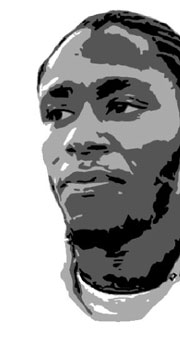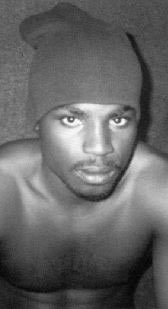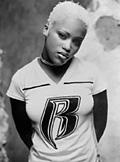JACK JOHNSON—there’s a reason Mos Def chose that name for his new rock and roll band. Johnson was the first black world heavyweight boxing champion, a man known for giving it out a whole lot better than he took it in. He even once knocked out five of his competitor’s teeth with a single punch. Johnson was a man fighting not only for his own dignity but also to knock white America off its haughty perch.
But Jack Johnson the man was not without contradictions. He married a white woman, twice. He owned a nightclub in Chicago and drove ostentatious cars. He sported gold teeth. His fervor for glam almost outstripped his passion for undermining the great white hopes of the era.
Would that, in his eagerness to topple rock and roll’s race politics, Mos Def had only paid attention to the pugnacious, anti-racist side of Johnson’s legacy. Instead, he put his own personal contradictions on display when he debuted his band at last month’s Lyricist Lounge 2 release party at New York’s Roseland Ballroom. That night Dante Beze, race man, was very much in effect. Taking intellectual cues from his own take-back-the-rock polemic “Rock-N Roll” (off his solo debut Black on Both Sides), Mos Def prowled the stage, microphone clutched tightly in his fist. Following a rather anodyne selection of underground rhymers, he had an unenviable mandate—revive a largely uninspired crowd and open the history book to a fresh chapter: Black Rock Revival.
For the lesson, Mos Def assembled a cast of craftsmen that encapsulated the evolution of black rock, post-Hendrix. Bernie Worrell, the Funkadelic veteran, manned the keys. Bad Brains founder Dr. Know strummed the guitar. And from Living Colour, which alongside ecstatic art-rockers Fishbone briefly spurred a black rock movement in the late 1980s, Mos plucked drummer Will Calhoun and bassist Doug Wimbish.
With all that potential on one stage, it would seem to be a given that the fire would be relit, the torch handed to Mos Def, and the genres—hip-hop and rock, that is—set to miscegenation. But if anything, Jack Johnson’s debut displayed the uncertain character of black rock, the public’s general ambivalence to the form, and Mos Def’s own hyperambition and penchant for showmanship.
As de facto bandleader, Mos Def could barely keep the stitches together. Instead of a coherent set, Mos veered from riff to riff, topic to topic, landing more often on a cover version or interpretation than on an actual song. Indeed, his set seemed like one long rehearsal. One minute it was O.C., the next Gregory Isaacs. There was a revisionist version of the Police’s “Roxanne” near the outset, and there was a revisionist version of the Batman theme song sung as “Black Man” near the end. But all told, Jack Johnson is a great unfulfilled concept that, despite Mos Def’s fire and brimstone, will still fail to crack even a contemporary rock landscape littered with faux rappers.
STRANGE, THOUGH, because rock is black music, and at no time has that been more obvious than the present, as piss-poor rap-metal hucksters litter the pop charts and the TRL countdown. Unfortunately, the faces behind the music are decidedly white, a slew of couldn’t-be frat boys who listened to a few NWA tapes and decided to start breaking stuff. The only person interested in kicking down the wall between rock and rap more than Mos Def is Fred Durst, but Mos would just as soon keep it insular: “I ain’t trying to dis, but I ain’t trying to fuck with Limp Bizkit.”
Just as race essentialism in hip-hop is beginning to be upended with the ascendance of Eminem and the forthcoming second wave of white MCs, Mos is retreating to rock, a space that has been hostile to difference these past few decades. To Mos, Fred Durst represents everything that’s wrong with contemporary rock, but in all honesty, there are clues to be found in contemporary rap-rock fusion. Chocolate Starfish and the Hot-Dog Flavored Water might not be the first place to look (though rappers from Xzibit to Method Man seem plenty content to let Durst play crossover publicist for them), but maybe Mos should take a listen to Everlast’s latest album for a glimpse at black rock’s tomorrow.
Sure, it’s bad form to give a white guy credit for revamping black rock. (I can hear Mos right now chomping at my ear, reprimanding me, “Elvis Presley ain’t got no soul/Chuck Berry is rock and roll/You may dig on the Rolling Stones/But everything they did, they stole.” Sure, but your man Jimi Hendrix didn’t have a problem covering Carl Perkins and the Beatles as easily as he does Chuck Berry on The Jimi Hendrix Experience boxed set.) Overwhelmingly, though, it’s been expat white rappers who’ve been forced to seek out new post-hop musical ground (try that title on, Tortoise). With their fingerhold on the so-called “real” tenable at best due to race, time only pushes them farther afield, allowing (or requiring) them to try out new ideas, new musical permutations.
Everlast tried on the outfit of modern-day bluesman with his 1998 debut, Whitey Ford Sings the Blues. In it, he found new uses for the authenticity so valued in hip-hop, telling tales of loss and fear, redemption and strength. On his follow-up, Eat at Whitey’s, he continues exploring those same blues traditions, though this time around he’s more content to let the rock flow. On “Whitey,” the album’s opener, Everlast posits himself as an urban folk hero. “What, you thought I stopped rhyming, because I started singing,” he challenges, “Picking on a six-string, wrist bling-blinging.” In Everlast’s cornucopian world, he can have his rock and beat-box it too. On the very next track, he acknowledges his role as an object of scorn. “They call me white devil, black Jesus,” he moans; either way, he’s a threat.
Nowhere is this more evident than on his cover of Slick Rick’s “Children’s Story.” Accompanied by human groove box Rahzel, Everlast breathes surprising life into this classic hardly in need of an update. His gruffalo style preserves the song’s grim undertone without robbing it of its fundamental sense of humor. It’s a skill he also put to work on his morose interpretation of Mobb Deep’s “Shook Ones Part II” from the largely misguided Loud Rocks album. A collection of rock covers of hip-hop songs from the Loud catalog, in most cases helped out by the original rappers themselves, Loud Rocks only proved the futility of cross-genre pollination. Over 13 tracks, only Everlast and Butch Vig’s band Grunge Is Dead tapped into the raw energy of their source material. Everywhere else, B-list acts from Static-X to Incubus (and even poor Ozzy Osbourne), in attempting to emulate the energy of the originals, only stamped all over them with their unwieldy musical feet.
If Loud Rocks proved anything, it was that covering hip-hop tracks isn’t the simple affair people expect it to be. Unfortunately, few people paid attention to the 1997 collection of hip-hop covers In tha Beginning . . . There Was Rap or the Straight Outta Compton tribute album. Poorly thought-out and even more sloppily executed, they were valuable object lessons. If rappers can’t adequately cover other rappers, there’s no reason to think the path to true black rock is to let a bunch of meatheads—black or white—with guitars act out their down-with-the-scene fantasies. That said, rap cover projects like Rebirth of the Loud (Priority) and Take a Bite Outta Rhyme (Republic/Universal) were doomed from the start, even if the latter did include Dynamite Hack’s clever almost-spoof of NWA’s “Boyz N the Hood.”
Something better could perhaps be expected of Zack de la Rocha and his fellow genre slummers in Rage Against the Machine. De la Rocha’s desire to be a rap MC, as opposed to a rock ranter, has been tangible these past few years, whether it’s muscling his way through a tour with the Wu-Tang Clan (until it imploded) or kicking rhymes alongside KRS-One and the Last Emperor on the first installment of the Lyricist Lounge project. Combine those desires with Rage’s ability to craft rock music that simultaneously attacks political issues while actually snapping necks, and it would appear that Rage could create a viable, crossover form of black rock. Their latest, Renegades, nods in that direction, with its rock covers of hip-hop classics, from Eric B & Rakim’s “Microphone Fiend” and EPMD’s “I’m Housin'” to the lesser-known “Pistol-Grip Pump” from LA underground veteran Volume 10.
But strangely, on this, Rage’s least political of records, de la Rocha’s ideology sticks out like a sore activist. What with his nasal rant so intimately linked with theories of resistance and uplift, its application to some of hip-hop’s seedier subject matter rings utterly false. As de la Rocha worms his way through “How I Could Just Kill a Man,” Cypress Hill’s decidedly unpretty take on wanton street vengeance, the sound of Zapatista rebels running for the hills is almost palpable.
IF ROCKERS CAN’T LOOK to rap for their cues to credibility and relevance, then where does the future of black rock lie? Surprisingly, it takes a pair of rappers and a spoken-word demon to save the genre in despair. “I will not rhyme over tracks/Niggas in the chain gang used to do that/Way back”: so asserted Saul Williams, star of the movie Slam and onetime New York performance poet about town, on his stunning 1998 single “Twice the First Time.” Now working out material from his as-yet-untitled debut album (to be released on American), he’s assembled a formidable live band whose members range from cellist to DJ (and even, at some shows, a live painter). Early material from his album proves one thing: You don’t have to be able to sing to be a rock star; it’s as much a philosophical position as an aesthetic one. “Do You Know” and “She’s Out of My Life” are as powerful as any other rock entreaties out there, and Williams pulls them off with nary a key in sight. Instead, he couples a thoroughly psychedelic funk sensibility with a gravitas-laden delivery. This union is more vital than almost any other music being made today. . . .
Except for OutKast. Yet again, Atlanta’s finest play the odd man out, the exception to every musical rule. Over their four albums, Andre 3000 and Big Boi have displayed an increasing reliance on sounds typically excluded from the hip-hop palette. On Stankonia, their latest, their excursions into rock may be merely the dabbles of artists learning a new medium, but even those fitful steps are cause for rejoicing. On “Gasoline Dreams,” the album’s most vibrant guitar workout, Dre takes a turn as crooner: “All of my heroes did dope. . . . I can’t cope.” Dre is a man who dreams about black rockers, from Hendrix to Prince, so it’s no surprise that he laments their downfall or bites their style. Damn if “Ms. Jackson” isn’t a stolen Prince reel, and if “?” and “Slum Beautiful” tickle your Sly Stone jones, then you’re well on the path to redemption. Unlike the mighty Mos Def, OutKast realize that the black rock legacy isn’t to be worn like a set of gold teeth and a fur coat. It needs to be noodled over, played through, and earned. Turns out the “power music, electric revival” that’s toasted on the outro to “Bombs over Baghdad” isn’t hip-hop after all. It’s time to rock and soul, proper-like.








